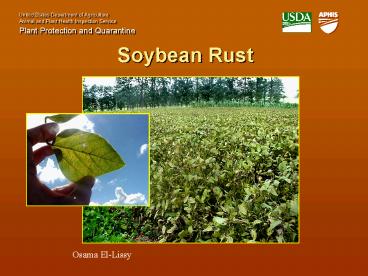Soybean Rust PowerPoint PPT Presentation
1 / 37
Title: Soybean Rust
1
Soybean Rust
United States Department of Agriculture Animal
and Plant Health Inspection Service Plant
Protection and Quarantine
Osama El-Lissy
2
Soybean Rust- Two species
- Phakopsora pachyrhizi
- aggressive species
- Phakopsora meibomiae
- less aggressive species
3
Courtesy C. Main, NCSU
4
Hosts of Soybean Rust
Non-Soybean Hosts Natural 30 species (17
genera) e.g. kudzu Artificial 60 species (26
genera)
Kudzu infected with soybean rust
5
- Japan 1902
- Asia/Australia 1934
- Puerto Rico (meibomiae) 1976
- Hawaii 1994
- Zimbabwe 1997/98
- South Africa 2001
- Paraguay 2001/02
- Brazil, Argentina 2001
- Bolivia 2003
- Uruguay, Colombia 2004
6
2001 - SBR in Brazil, USDA strategic planning
7
Soybean Rust Strategic Plan
Commodity Entry Standards
8
(No Transcript)
9
Spread of Soybean Rust
- Windborne urediniospores
- Not seedborne planting contaminated seed will
not result in SBR - Soybean meal, grain, seed? NOT likely (see
evidence of low risk)
10
Soybean Rust Strategic Plan
Soybean pest survey, including SBR- MS, OH, VA,
WI, PA, FL, IL, HI, TX
11
Soybean Rust Strategic Plan
Outreach
12
- PCR Training
- Carrie Harmon, Univ of FL
- Cheryl Blomquist, CDFA
- Clarissa Balbalian, MS State Univ.
- Janette Jacobs, MI State Univ.
- Joy Pierzynski, KS State Univ.
- Karen L. Snover-Clift, Cornell Univ.
- Karen Rane, Purdue Univ.
- Kim Maxson, TX Tech
- Mary Ann Hansen, VA Tech
- Melodie Putnam, OR State Univ.
- Nancy Pataky, Univ. of IL
- More
13
Outreach
PPQ purchased 25,000 copies- distributed to
extension specialists and integrated pest
managers at 78 locations to distribute to soybean
growers and crop consultants.
14
SBR ID card - Anne Dorrance, Ohio State Univ.
(APHIS purchased 500,000)
15
Soybean Rust Strategic Plan
Protection
Incident Coordination
Detection
- Communications
- National
- Local
MN- Mock Exercise, 9/27-30/2004
Response
- Technical Support
- Incident Assessment
- Surveillance
- Management
- Forecasting
Recovery
16
Initial detection in Louisiana
- Nov. 6, 2004
- Production farm operated by LSU, while looking at
Cercospora leaf blight
Federal, State, University coordinated ICS
17
National SBR Assessment Team
- Morris Bonde
- Russ Bulluck
- Reid Frederick
- Glen Hartman
- Monte Miles
- Anwar Rizvi
- Arnold Tschanz
- X.B. Yang
18
Assessment Team Deployment
- Met at 7 AM at ICC
- Briefed on GPS
- Divided into 4 groups
- Each team with 2 experts and LDAF/LSU AgCenter
personnel
19
Field Observations
20
Team 1 Assessment Loop
- 11 locations
- 270 miles roundtrip
21
Microscopic Examination
- Field samples brought to laboratory
- Leaves checked for SBR pustules
22
APHIS Emergency Operations Center (Headquarters)
23
(No Transcript)
24
Soybean Rust Strategic Plan
Protection
Protection
Detection
Response
Recovery
25
Soybean Rust Plan
26
Soybean Rust 2005 Coordinated Framework
- SBR Surveillance and Monitoring Network
- Decision criteria for fungicide application
- Web-based decision support system
- Predictive models
- Outreach
27
Soybean Rust Activity Flow From Planning to
Management
Planning
Research
Modeling
Training
Education
Information Dissemination
Monitoring Scouting
USDA Industry Consultants
University Grower Distributor
Management
28
www.usda.gov/soybeanrust
29
(No Transcript)
30
(No Transcript)
31
ASBR Presence in US
32
Overwintering Potential of Leguminous Hosts
Probability for survival of overwintering hosts
based on occurrence of temperatures greater than
28o F in a given year using 10-year daily
climate data interpolated to a 10km2 resolution.
33
(No Transcript)
34
2005 Timeline
- Jan- outreach, planning
- Feb- delist meeting on 4th for Coordinated
Framework estimate budget - Mar- survey natural hosts in south
- Apr- soybeans planted
- May-Nov- coordinated framework operating
- Nov- lessens learned (APS Nov 15-16, Nashville),
plan for transition from APHIS
35
SBR Transition from APHIS
- September, 2005- Cooperative Partnership
Agreement signed between RMA, CSREES, and the
Southern Region Integrated Pest Management Center
(SRIPMC) at North Carolina State University
(funds provided by RMA). - GOAL 1 Support SBR management by expanding the
USDA SBR Information System to include an RMA
website tool for documenting growers good
management practices. - GOAL 2 Broaden the scope of the SBR effort to
include lesser-served, specialty legume crops and
associated pests. The Agreement provides funds
for sentinel plots, mobile scouting,
aerobiological monitoring, diagnostics, outreach,
and information technology tool development.
APHIS will share leadership with SRIPMC, i.e.
training on framework mechanics only for 2006,
website maintenance, and data archives.
36
ERS- 2nd study
- A DRAFT was received for review, October 2005,
"The value of information from USDAs Soybean
Rust Coordinated Framework What if you build
it, and Rust does not come?" - The document is under review and ERS aims to
release it early in 2006. Initial findings are
37
Thanks

